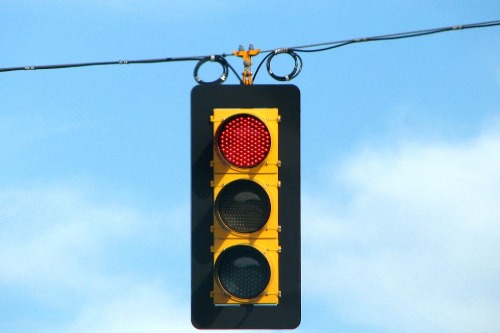1. Jaywalking Like It’s Nothing

In many U.S. cities, crossing the street outside of a crosswalk is almost a daily habit. Americans tend to treat pedestrian signals as suggestions rather than strict rules. In contrast, countries like Japan and Germany enforce jaywalking laws rigorously, and pedestrians can get fined. It’s not just about following rules—it’s about cultural norms that prioritize safety over convenience.
This casual approach often surprises travelers. They expect strict adherence to crosswalks and traffic signals, which is standard in much of Europe and Asia. Ignoring these rules in those countries can lead to more than just fines; it’s seen as socially unacceptable. Americans often shrug it off, thinking, “It’s quicker this way,” without realizing how differently others view street etiquette.
2. Ignoring Smoking Bans

In the U.S., smoking bans exist in many public areas, but enforcement can be spotty. Some people light up in outdoor patios or near entrances despite posted restrictions. In contrast, countries like Australia or Norway have strict fines and social pressure to comply. The casual American attitude can make it seem like these rules are optional rather than mandatory.
Tourists often notice the difference immediately. In places where smoking is tightly regulated, even a small violation can draw attention or a hefty fine. Americans’ more relaxed approach can feel out of place abroad. It highlights how cultural tolerance shapes what people consider “enforceable” versus “guidelines.”
3. Ignoring Speed Limits

Speed limits in the U.S. are often treated as flexible, especially on highways. Drivers routinely go 5–15 miles per hour over the posted limit without fear of consequence. Meanwhile, countries like Sweden or the UK use strict enforcement cameras and stiff fines to keep drivers in check. Speeding is treated as a serious safety concern rather than a minor inconvenience.
The casual attitude in the U.S. comes from the perception of vast, open roads and self-policing. But in many European or Asian countries, even a small infraction can result in immediate fines or license points. This difference can be jarring for visitors. It underscores how the same rule can be seen as “optional” versus “non-negotiable” depending on where you are.
4. Overusing the Right Turn on Red

In most U.S. states, turning right on red is legal unless posted otherwise. Americans often take this for granted, using it as a quick way to avoid waiting. In contrast, countries like Germany or Japan strictly forbid turning on red lights. The assumption that it’s universally acceptable can create confusion for travelers.
This habit reflects broader cultural flexibility with traffic rules. The U.S. approach emphasizes efficiency over strict compliance. Elsewhere, even a single violation can be considered reckless. Americans may not realize that what’s seen as a convenience at home is illegal and risky abroad.
5. Skipping Tipping Norms Abroad

While tipping is expected in the U.S., Americans often ignore local customs when traveling. In countries like Japan, tipping is not customary and can even be considered rude. Americans’ ingrained habit to tip everywhere can create awkward social situations. It shows how following rules is tied not just to law but to social etiquette.
Tipping is more than a monetary gesture; it’s a reflection of cultural respect. Americans accustomed to automatic gratuity may be surprised by the different expectations abroad. This disconnect highlights how rules and norms vary, and why understanding them matters. Breaking these “rules” is rarely illegal, but it can mark someone as culturally insensitive.
6. Not Recycling Properly

Recycling rules in the U.S. vary wildly by state or city, and many people ignore them altogether. Plastics, metals, and paper often end up in the same bin regardless of guidelines. In countries like Germany, residents strictly separate waste into multiple bins and face fines for mistakes. The U.S. approach makes recycling seem optional rather than required.
The casual attitude toward recycling can have real environmental consequences. Residents of stricter countries see it as a civic duty, not a suggestion. Americans often view recycling as a low-priority habit. This reflects how seriously other nations enforce even minor rules for collective benefit.
7. Littering in Public Spaces

Despite laws against it, Americans often litter in parks, streets, and highways. Small acts like tossing wrappers or cigarette butts go largely unnoticed. Meanwhile, countries like Singapore enforce littering fines rigorously, with public shaming sometimes included. The cultural expectation is that public cleanliness is everyone’s responsibility.
Visitors notice the stark difference immediately. Streets in countries with strict anti-littering policies are almost pristine. Littering is not just illegal—it’s socially unacceptable. Americans may shrug, thinking a small piece of trash isn’t a big deal, but other countries treat it as a serious violation.
8. Cutting Lines

Jumping ahead in lines is surprisingly common in the U.S., especially at casual spots like coffee shops or amusement parks. Many Americans justify it as saving time or being “efficient.” In places like the UK or Japan, cutting in line is socially unacceptable and can provoke confrontation. Queuing rules are taken very seriously abroad.
Line etiquette is seen as a reflection of respect for others. In countries with strict norms, even minor infractions are frowned upon. Americans’ casual approach to lines can appear rude or chaotic. This shows how minor social rules are enforced more stringently elsewhere.
9. Using Phones While Driving

Texting or scrolling while driving is alarmingly common in the U.S., even where it’s illegal. Many Americans rationalize it as harmless multitasking. In contrast, countries like Norway and Australia impose strict bans with hefty fines. Driving rules are not just suggestions—they’re enforced rigorously.
Distracted driving laws are stricter elsewhere for good reason. Other countries see phones as a direct threat to safety. The U.S. culture of multitasking behind the wheel stands out as uniquely permissive. Ignoring these rules abroad can carry serious consequences.
10. Ignoring Water Usage Restrictions

Drought-prone areas in the U.S., like California, have regulations on watering lawns, washing cars, or filling pools, but compliance is often lax. Americans may water their lawns freely despite restrictions. In countries like Australia, strict rules and fines regulate water usage. Conserving water is treated as a civic duty rather than optional.
Ignoring these rules in the U.S. reflects a sense of abundance. Abroad, scarcity is enforced through law and social norms. Residents in stricter regions see violations as irresponsible. It highlights how necessity shapes rule-following behavior.
11. Overlooking Quiet Hours

Noise ordinances exist in most U.S. cities, but enforcement can be inconsistent. Parties, lawn mowers, or construction often run late into the night. In countries like Switzerland or Germany, noise rules are taken seriously, and violators can face fines or neighbor complaints. Respecting quiet hours is seen as part of civic responsibility.
The casual American approach contrasts sharply with countries emphasizing community peace. Noise violations abroad can lead to immediate action. Americans often treat sound restrictions as suggestions rather than strict rules. Cultural tolerance shapes whether rules are enforced or ignored.
12. Disregarding Bicycle Rules

Cyclists in the U.S. often run red lights, ride on sidewalks, or ignore bike lane regulations. Many people see bicycles as flexible and low-risk vehicles. In countries like the Netherlands, cycling laws are strictly enforced, and safety rules are taken seriously. Breaking them isn’t just dangerous—it’s socially unacceptable.
The difference shows how transportation culture affects rule-following. In bike-centric nations, rules are designed to protect everyone, including pedestrians and drivers. Americans’ more relaxed approach can feel reckless abroad. The contrast highlights how safety and order are valued differently around the world.
13. Ignoring Public Transportation Etiquette

In the U.S., subway and bus rules—like yielding seats, queuing, or keeping quiet—are often treated as optional. Riders may eat, play music, or block doors without concern. In countries like Japan or Singapore, public transport etiquette is enforced socially and sometimes legally. Following these “unwritten rules” is expected and considered polite.
American casualness can seem chaotic to international travelers. Public transportation is treated as a shared space requiring respect elsewhere. Violating these norms can draw glare or reprimands. This highlights how rules can be about community respect as much as law.
This post 13 Ways Americans Ignore Rules That Other Countries Take Seriously was first published on American Charm.


